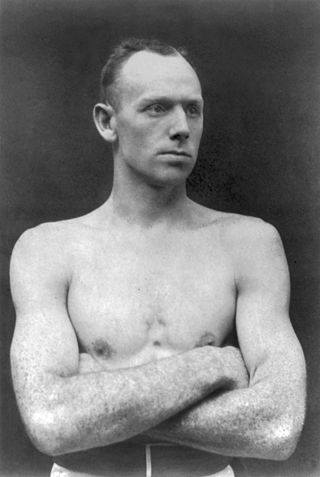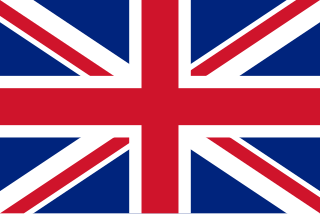
Thomas Hearns is an American former professional boxer who competed from 1977 to 2006. Nicknamed the "Motor City Cobra", and more famously "The Hitman", Hearns's tall, slender build and long arms and shoulders allowed him to move up over fifty pounds (22.7kg) in his career and become the first boxer in history to win world titles in five weight divisions: welterweight, light middleweight, middleweight, super middleweight and light heavyweight.

Alan Sydney Minter was a British professional boxer who competed from 1972 to 1981. He held the undisputed middleweight title in 1980, having previously held the British middleweight title from 1975 to 1976, and the European middleweight title twice between 1977 and 1979. As an amateur, Minter won a bronze medal in the light-middleweight division at the 1972 Summer Olympics.

Emile Alphonse Griffith was an American professional boxer who won world titles in three weight divisions. He held the world light middleweight, undisputed welterweight, and middleweight titles. His best-known contest was a 1962 title match with Benny Paret. Griffith won the bout by knockout; Paret never recovered consciousness and died in the hospital 10 days later.

Robert James Fitzsimmons was a British professional boxer who was the sport's first three-division world champion. He also achieved fame for beating Gentleman Jim Corbett, and he is in The Guinness Book of World Records as the lightest heavyweight champion, weighing just 167 pounds when he won the title. Nicknamed Ruby Robert and The Freckled Wonder, he took pride in his lack of scars and appeared in the ring wearing heavy woollen underwear to conceal the disparity between his trunk and leg-development.

Billy Papke was an American boxer who held the World Middleweight Championship from September 7 to November 26, 1908. In 1910-12, he also took the Australian and British versions of the World Middleweight Championship, though American boxing historians generally take less note of these titles. With a solid and efficient punch, 70 percent of his better publicized career wins by decision were from knockouts, and roughly 40% of his reported fights were as well. Papke was inducted into the International Boxing Hall of Fame in 2001. Sportswriter Nat Fleischer, original owner of "Ring" Magazine, ranked Papke as the seventh best middleweight of all time. Announcer Charley Rose ranked him as the tenth greatest middleweight in boxing history. He was elected to the Ring Boxing Hall of Fame in 1972.
Peter Manfredo Jr. is an American former professional boxer and former IBO middleweight champion. He has challenged twice for upper-level world titles, at middleweight and super middleweight, as well as having won the NABO, IBU and European Boxing Association (EBA) light middleweight titles.

Amateur boxing is the variant of boxing practiced in clubs and associations around the world, at the Olympic Games, Pan American Games and Commonwealth Games, as well as at the collegiate level.
The bantamweight was one of five boxing weight classes contested on the boxing at the 1908 Summer Olympics programme. Like all other boxing events, it was open only to men. The boxing competitions were all held on October 27. The bantamweight was the lightest class, allowing boxers of up to 116 pounds (52.6 kg). Six boxers from two nations competed. Each NOC could enter up to 12 boxers. France entered 3 boxers, 2 of whom withdrew; Great Britain entered 5 boxers.
The lightweight was one of five boxing weight classes contested on the 1908 Summer Olympics programme. Like all other boxing events, it was open only to men. The boxing competitions were held on October 27. The lightweight was the middle class, allowing boxers of up to 140 pounds (63.5 kg). Twelve boxers from three nations competed. Each NOC could enter up to 12 boxers. Australasia entered 1 boxer, who withdrew; France entered 3 boxers, 2 of whom withdrew; Denmark entered 2 boxers; and Great Britain entered 9 boxers.
The middleweight was one of five boxing weight classes contested on the boxing at the 1908 Summer Olympics programme. Like all other boxing events, it was open only to men. The boxing competitions were all held on October 27. The middleweight was the second-heaviest class, allowing boxers of up to 158 pounds (71.7 kg). It was the only boxing event in which a non-British boxer won a bout. Reginald Baker from Australia won three before losing to Johnny Douglas in the final. Ten boxers from three nations competed. Each NOC could enter up to 12 boxers. Australasia entered 1 boxer; France entered 5 boxers, 2 of whom withdrew; and Great Britain entered 6 boxers.
The heavyweight was one of five boxing weight classes contested on the boxing at the 1908 Summer Olympics programme. Like all other boxing events, it was open only to men. The boxing competitions were all held on October 27. The heavyweight was the middle class, allowing boxers of any weight. Six boxers all from Great Britain competed. Each NOC could enter up to 12 boxers. France entered 1 boxer, who withdrew; Great Britain entered 7 boxers, 1 of whom withdrew, and the Netherlands entered 1 boxer, who withdrew.

Great Britain, represented by the British Olympic Association (BOA), competed at the 1924 Summer Olympics in Paris, France. This was the first Summer Olympics in which athletes from the newly independent Irish Free State competed separately. Following the Royal and Parliamentary Titles Act 1927, the name changed (officially) to 'United Kingdom of Great Britain and Northern Ireland' but the Olympic team competed as Great Britain from the 1928 games onwards. 267 competitors, 239 men and 28 women, took part in 115 events in 18 sports.
Henry William Mallin was an English middleweight amateur boxer. He came originally from Hackney Wick, his younger brother was the Olympic boxer Fred Mallin. He lived in Dartmouth Park, North London and was a police officer with the Metropolitan Police.

Italy competed at the 1924 Summer Olympics in Paris, France. 200 competitors, 196 men and 4 women, took part in 93 events in 18 sports.

Vijender Singh Beniwal is an Indian professional boxer and politician of Bharatiya Janata Party. As an amateur, he won a bronze medal at the 2008 Beijing Olympics, becoming the first Indian boxer to win an Olympic medal. He also won bronze medals at the 2009 World Championships and the 2010 Commonwealth Games, as well as silver medals at the 2006 and 2014 Commonwealth Games, all in the middleweight division.
The men's welterweight event was part of the boxing programme at the 1924 Summer Olympics. The weight class was the fourth-heaviest contested, and allowed boxers of up to 147 pounds. The competition was held from Tuesday, July 15, 1924, to Sunday, July 20, 1924. 29 boxers from 19 nations competed. Giuseppe Oldani was disqualified in his round of 16 bout against Douglas Lewis by referee T. H. Walker for persistent holding. Oldani's supporters pelted Walker with sticks, coins and walking stick knobs. This went on for nearly an hour, until Walker was escorted from the arena under the protection of several British, American and South African boxers.
Roger Brousse was a French boxer. He competed in the 1924 Summer Olympics. In 1924, Brousse initially was awarded the victory on points in his quarter-final bout of the middleweight class. However, he was later disqualified for having bitten his opponent, the eventual gold medallist, Harry Mallin.
Justann John Crawford is a retired indigenous Australian Olympic boxer. Justann earned 9 international gold medals and represented Australia at the 1992, 1996 Olympic Games and 1994 Commonwealth Games. He also held 9 Australian boxing titles mainly in the middleweight division, or in the light heavyweight division.

Pat O'Keeffe, was a professional English boxer who became the British champion in both the welterweight and middleweight weight classes. His professional career spanned the years between 1902 and 1918. In 1914 he made an unsuccessful bid for the European heavyweight belt, losing to Georges Carpentier. Between 1907 and 1910 he left Britain and continued his boxing career in the United States, and then Australia. On the outbreak of World War I he joined the British Army to work as a Physical Training Instructor (PTI) and Recruiting Sergeant for the 1st Surrey Rifles. He won the Lonsdale Belt outright when he defeated Bandsman Blake at the National Sporting Club (N.S.C) on 28 January 1918, becoming British Middleweight Champion.

Joe Bowker was a British boxer who was world bantamweight champion from 1904 to 1905. His defeat of Frankie Neil on 17 October in London for the world bantamweight title was acclaimed as the most remarkable event in the sport in 1904.











